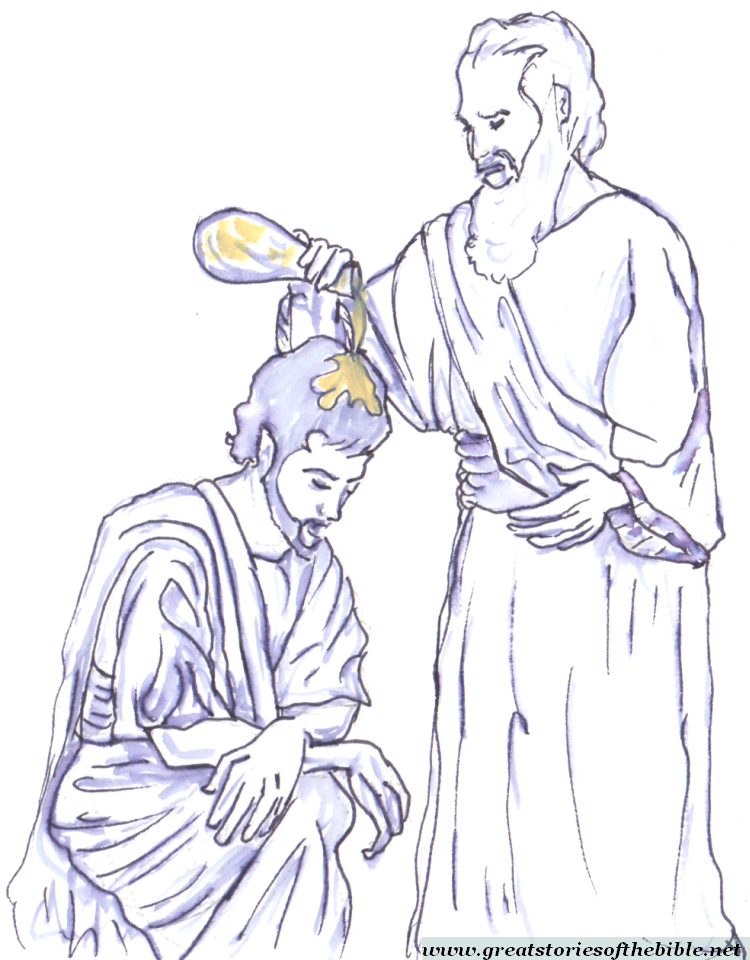Saul
Like all the other nations
We start in this post the great kings of Israel’s story. The book of the Judges ends with the lack of a stable authority for the people. The last of the Lord’s Judges is Prophet Samuel. I invite you to read his story in chapter 1 and following of the first book that has his name, in particular his mother Hannah’s prayer (1Sam 2,1-10: evangelist Luke will be inspired by it for the composition of the Magnificat). Samuel’s sons are not as honest as he was in government affairs, therefore, when he is old, Israel decides to ask the Lord for «a king to judge us like all the nations». The request seems legitimate, but it is not. Israel is not «like all the nations»: the Lord chose them as his personal property, redeeming them from the Pharaoh’s power with great signs and wonders. Until now they did not have a human king because God himself ruled them: «But the thing displeased Samuel, when they said, “Give us a king to judge us.” Samuel prayed to the LORD. The LORD said to Samuel, “Listen to the voice of the people in all that they tell you; for they have not rejected you, but they have rejected me, that I should not be king over them. According to all the works which they have done since the day that I brought them up out of Egypt even to this day, in that they have forsaken me, and served other gods, so do they also to you. Now therefore listen to their voice: however you shall protest solemnly to them, and shall show them the way of the king who shall reign over them.”». Despite Samuel alerting the people that the king will take the best of their properties and will reduce their freedom, the people continue to insist in their request. They will have a king, Saul (whose name in Hebrew means “asked”) but only the Lord will have the right to choose him. «Now there was a man of Benjamin, whose name was Kish, the son of Abiel, the son of Zeror, the son of Becorath, the son of Aphiah, the son of a Benjamite, a mighty man of valor. He had a son, whose name was Saul, an impressive young man; and there was not among the children of Israel a better person than he. From his shoulders and upward he was higher than any of the people. The donkeys of Kish, Saul’s father, were lost. Kish said to Saul his son, “Take now one of the servants with you, and arise, go seek the donkeys.”». Saul and his servant go near prophet Samuel’s dwelling and so decide to ask him for help to find the animals. This is the Lord’s chosen occasion to consecrate Saul king of Israel. «Then Samuel took the vial of oil and poured it on his head, and kissed him, and said, “Has not the LORD anointed you to be ruler over his people Israel? And you shall rule over the people of the LORD, and you shall save them out of the hand of their enemies all around. And this shall be the sign to you that the LORD has anointed you to be ruler over his inheritance».

A second ceremony, this time public, takes place in Mizpah some time later: «So Samuel brought all the tribes of Israel near, and the tribe of Benjamin was taken. He brought the tribe of Benjamin near by their families; and the family of the Matrites was taken; and Saul the son of Kish was taken». «Now when Saul had taken the kingdom over Israel, he fought against all his enemies on every side, against Moab, and against the children of Ammon, and against Edom, and against the kings of Zobah, and against the Philistines; and wherever he turned, he put to the worse. And he did valiantly, and struck the Amalekites, and delivered Israel out of the hand of its plunderer. Now the sons of Saul were Jonathan, and Ishvi, and Malchishua; and the names of his two daughters were these: the name of the firstborn Merab, and the name of the younger Michal: and the name of Saul’s wife was Ahinoam the daughter of Ahimaaz. The name of the captain of his army was Abner the son of Ner, Saul’s uncle. Kish was the father of Saul; and Ner the father of Abner was the son of Abiel. There was severe war against the Philistines all the days of Saul: and when Saul saw any mighty man, or any valiant man, he took him to him».
The Lord gives an important task to Saul; he has to utterly destroy the Amalekites, who fought against Israel during the way to the Sinai (Exodus 17: do you remember Moses with his raised arms held by Aaron and Hur?), fulfilling God’s prophecy: «Saul struck the Amalekites, from Havilah as you go to Shur, that is before Egypt. He took Agag the king of the Amalekites alive, and utterly destroyed all the people with the edge of the sword. But Saul and the people spared Agag, and the best of the sheep, and of the cattle, and of the fatlings, and the lambs, and all that was good, and wouldn’t utterly destroy them: but everything that was vile and refuse, that they destroyed utterly». In the next post we will see the consequences of that disobedience to the Lord.